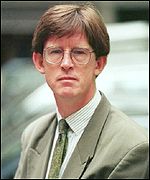Difference between revisions of "Ian Hargreaves"
| Line 25: | Line 25: | ||
Johann Hari, in The Independent, April 9, 2007 , picks up on the numerous absurdities of this, stating inter alia, that | Johann Hari, in The Independent, April 9, 2007 , picks up on the numerous absurdities of this, stating inter alia, that | ||
| − | :"You can see this classic BBC "balance" in practice on Radio 4's The Moral Maze, where it is common to hear two barking-right voices - [[Melanie Phillips]] and [[ | + | :"You can see this classic BBC "balance" in practice on Radio 4's The Moral Maze, where it is common to hear two barking-right voices - [[Melanie Phillips]] and [[Claire Fox]] - counterbalanced by a centre-right voice ([[Michael Portillo]]) and a meek watery liberal (Ian Hargreaves)." |
== Bioss == | == Bioss == | ||
Latest revision as of 17:31, 2 January 2011
Ian Hargreaves is the former Deputy Editor of the Financial Times and the Independent (with Martin Jacques). He oversees UnLtd, Ashoka, CAN, ERA and other Mezzanine 'charities'. Attended the Ditchley Foundation on 7 November 1998, writes for Prospect and is involved in the IPPR. He was recently appointed as spin doctor (post 9/11) to British Airports Authority. He is also member of the Centre for European Reform (CER), a lobby group associated with the American Enterprise Institute and Atlantic Council of the United Kingdom.
He actively supports a range of UK and international organisations, from Demos to Greenpeace. His partner, Adele Blakebrough, is co-founder and Director of Community Action Network now based in the Mezzanine 2 along with Transparency International and Internews.
Career
Initially Hargreaves worked on the Financial Times as an industrial reporter. In an 11-year spell on the FT, eventually becoming Features Editor. In 1987 he became Managing Editor, then Director, of BBC News and Current Affairs — returning to the Financial Times as Deputy Editor in 1990, before becoming Editor of the Independent in 1994. Editor of the New Statesman, 1996-98, before taking up position at Cardiff University as Director of the Centre for Journalism Studies.
In 2002, Hargreaves became Director of Corporate and Public Affairs for BAA plc and a Member of the Board of the Office of Communications (Ofcom). In March 2007 he was appointed as Senior Partner in a new executive role on the Board with responsibility for leadership of Ofcom’s engagement with European and international bodies. He was a member of the Chancellor's Social Investment Task Force. He is also a former director of Greenpeace UK and of the South London and Maudsley NHS Trust.
In 2008 he was appointed Strategic Communications Director for the Foreign and Commonwealth Office on secondment from Ofcom, who said:
- “As the FCO's Strategic Communications Director, Ian will have responsibility for communications and public advocacy issues, organising the FCO's public diplomacy network both at home and overseas. He will also coordinate the FCO's wider public advocacy tools, working closely with the British Council and the BBC World Service.”
He is also a member of the Commission on British Muslims and Islamophobia, set up by the Runnymede Trust in 1996.
New Statesman
After the New Statesman was bought by Geoffrey Robinson, the Labour MP and businessman, he fired its editor and appointed Ian Hargreaves in his place. Hargreaves in turn fired most of the left-wingers on the staff and turned the Statesman into a strong supporter of Tony Blair as Labour leader.
Hargreaves was at Foreign Scretary David Miliband's side for his "unofficial Labour leadership launch (sorry, press conference) with the Italian foreign minister last week," according to The Evening Standard, (August 6 2008) titled 'Who wants to spin for David Miliband?' It was David Miliband, who appointed Hargreaves as director of Foreign Office communications. Geoffrey Robinson is said to have took advice from Hargreaves in his search for a new editor for the New Statesman, along with Guardian chairman Paul Myners according to The Evening Standard, (March 19, 2008).
With his position on Ofcom Hargreaves was outraged by something Johnathon Ross said on TV. What he described as the "single most shocking breach of impartiality on the BBC in recent years" in the BBC Trust's report on impartiality. The Guardian June 25, 2007, noted that the 'damning judgment' handed down by Hargreaves, quoted in the report, related to the following: "Ross suggested viewers might like to sign up to a petition during the Live8 concerts two years ago. "If you want to do that, feel free," Ross told viewers, before adding with a comedy wink, "I'm not asking you to because we're the BBC and we're impartial!"
Johann Hari, in The Independent, April 9, 2007 , picks up on the numerous absurdities of this, stating inter alia, that
- "You can see this classic BBC "balance" in practice on Radio 4's The Moral Maze, where it is common to hear two barking-right voices - Melanie Phillips and Claire Fox - counterbalanced by a centre-right voice (Michael Portillo) and a meek watery liberal (Ian Hargreaves)."
Bioss
He is also a Director of Bioss International, yet another consultancy based in (and easily moved out of) 33 St. James's Square. This has also been the home of Strategic Communication Laboratories. It is what is termed a 'serviced office': fully furnished office space with managed facilities or a 'virtual office', whereby the client gains a prestigious address with a business listing for a specific purpose and then vanish, rather like in the spy films.
Affiliations
- Financial Times -- former Deputy Editor
- Independent -- former Editor
- New Statesman -- former Editor
- BBC News -- director
- Centre for European Reform -- member
- Centre for Journalism Studies, University of Cardiff -- Director
- Greenpeace (UK) -- former director
- BIOSS International -- director
Publications
- Journalism: A Very Short Introduction. Oxford University Press, 2005.
- Journalism: Truth or Dare. Oxford University Press, 2003.
- New Mutualism in from the Cold 42 pages, 1999 Co-operative Press: London

